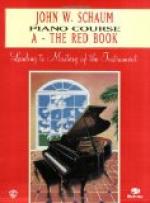In teaching, Von Buelow required the same qualities which were so patent in his playing. Clearness of touch, exactness in phrasing and fingering were the first requirements; the delivery of the composer’s idea must be just as he had indicated it—no liberties with the text were ever permitted. He was so honest, so upright in his attitude toward the makers of good music, that it was a sin in his eyes to alter anything in the score, though he believed in adding any marks of phrasing or expression which would elucidate the intentions of the composer. Everything he said or did showed his intellectual grasp of the subject; and he looked for some of the same sort of intelligence on the part of the student. A failure in this respect, an inability to apprehend at once the ideas he endeavored to convey, would annoy the sensitive and nervous little Doctor; he would become impatient, sarcastic and begin to pace the floor with hasty strides. When in this state he could see little that was worthy in the student’s performance, for a small error would be so magnified as to dwarf everything that was excellent. When the lion began to roar, it behooved the players to be circumspect and meek. At other times, when the weather was fair in the class-room, things went with tolerable smoothness. He did not trouble himself much about technic, as of course a pupil coming to him was expected to be well equipped on the technical side; his chief concern was to make clear the content and interpretation of the composition. In the lessons he often played detached phrases and passages for and with the student, but never played an entire composition.
One of the most remarkable things about this eccentric man was his prodigious memory. Nearly every work for piano which could be mentioned he knew and could play from memory. He often expressed the opinion that no pianist could be considered an artist unless he or she could play at least two hundred pieces by heart. He, of course, more than fulfilled this requirement, not only for piano but for orchestral music. As conductor of the famous Meiningen orchestra, he directed every work given without a note of score before him—considered a great feat in those days. He was a ceaseless worker, and his eminence in the world of music was more largely due to unremitting labor than to genius.
From the many suggestions to the Berlin class, the following have been culled.
“To play correctly is of the first importance; to play beautifully is the second requirement. A healthy touch is the main thing. Some people play the piano as if their fingers had migrane and their wrists were rheumatic. Do not play on the sides of the finger nor with a sideways stroke, for then the touch will be weak and uncertain.
“Clearness we must first have; every line and measure, every note must be analyzed for touch, tone, content and expression.
“You are always your first hearer; to be one’s own critic is the most difficult of all.




